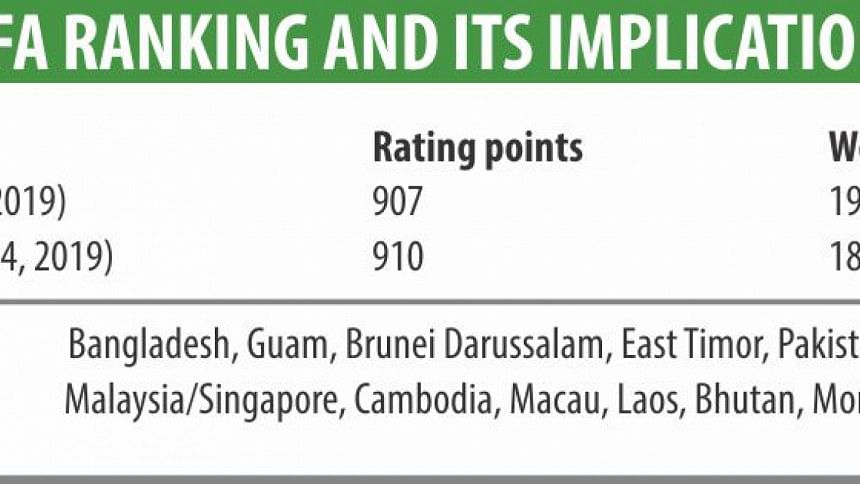Another four years in the wilderness?

April 4, 2019 and April17, 2019 could define the future of Bangladesh football. On those two days we will get to learn what is in store for the national team over the next four years.
On the 4th of next month, FIFA will announce its latest world rankings while on the 17th of April, based on the April 4 rankings, the draw for the first round of the joint qualifiers for the 2022 FIFA World Cup and the Asian Cup 2023 will be decided.
These two events could have massive implications for the Bangladesh team in the form of how many FIFA/AFC games they will get to play in the next four-year cycle. In the worst-case scenario, it could be down to two matches while in the best-case scenario, they will potentially get at least 14 matches.
The draw for the first round of the joint qualifiers would deem teams ranked 41st to 46th in Asia as unseeded and teams from 35th to 40th as seeded ones. The six seeded teams will be pitted against six unseeded teams in the double-legged playoff, with the six winners joining the top 34 teams for the group stages of the qualifiers. The six losing teams, on the other hand, will have to say goodbye to FIFA/AFC competitive matches for the next four years.

When the next rankings are published next week, according to our calculation, Bangladesh will move to 910 rating points from their current 907, thanks to their 1-0 win over Cambodia in the FIFA friendly on March 9. That means Bangladesh would move four places up in the world rankings and one place up among Asian nations. The men in red and green would overtake Guam, but would still be five points behind 40th-ranked Mongolia, who are likely to stay on their current 915 points. That means Bangladesh would still be one of the bottom six teams and therefore would be one of the unseeded teams for the joint qualifiers.
Had the match against Cambodia been played during a FIFA window [It was played outside the FIFA calendar], however, a win would have taken Bangladesh to 913 rating points due to higher weight attributed to matches on FIFA calendar days. That would have kept Bangladesh in with a chance of being one of the seeded teams, given that the higher ranked teams lost some valuable points during this time.
But that did not turn out to be the case. What we are presented with currently is that Bangladesh will be one of the six unseeded teams alongside Sri Lanka, Pakistan, Guam, East Timor and Brunei Darussalam. And these six teams will be pitted against six seeded teams -- Malaysia/Singapore, Cambodia, Macau, Laos, Bhutan and Mongolia. On paper, this looks like a tall ask for the men in red and green and it is needless to say that Bangladesh would have preferred to avoid facing a seeded team.
To put things in perspective, let us rewind to four years ago when the draw was made for the 2018 World Cup and the 2019 Asian Cup.
Bangladesh were placed 30th among 46 countries in Asia during the cut-off date of ranking for the draw, which gave them a bye for the first round of playoffs, ensuring the team eight matches against Asian powerhouses such as Australia, Jordan, Kyrgyzstan and Tajikistan.
Two rounds of double-legged playoff matches followed, where Bangladesh lost against Kyrgyzstan in both legs of the first round before that fateful defeat over two legs against Bhutan. That defeat against Bhutan not only denied the men in red and green at least six more matches against other Asian teams and a shot at the Asian Cup proper, it also fatally dragged them down below the 180-mark and subsequently below the 190-mark in FIFA rankings, from where they have failed to lift themselves over the past two years. And that has been the root cause of the current desperate situation that the team finds itself in.
But the writing has been on the wall for a long time. The valid question that arises here is: has the game's local governing body taken enough measures to ensure more FIFA friendlies on FIFA calendar dates in a bid to earn a few more rating points, which could have helped the team avoid the unseeded status?
When asked what plans they had regarding the team's FIFA fixtures, the Bangladesh Football Federation's (BFF's) general secretary Abu Nayeem Shohag said, “We organised a FIFA Friendly against Cambodia on March 9. We are trying to arrange for more such matches, but we have to also consider our domestic league and the clubs' interest before planning for such matches.”
It may be mentioned here that prior to the match against Cambodia this month, Bangladesh's last FIFA friendly was against Laos in March last year; and in the meantime the senior team had only played two tournaments – the SAFF Championship and the Bangabandhu Gold Cup.
Since the end of the Bangabandhu Gold Cup, there were two more windows in the FIFA calendar – in November, 2018 and in March, 2019 – which Bangladesh did not make use of. In November the national team players were busy with domestic football while during the March window, there was the under-23 team's assignment in the AFC U-23 Championship Qualifiers where many of the national team players were playing.
Despite seeing the looming danger, Bangladesh team's coach Jamie Day is putting on a brave face. The English coach has done a wonderful job since his appointment in May last year, guiding the Olympic team to the knock-out rounds of the Asian Games for the first time last year and notching the first victory in Bangladesh's history of the AFC U-23 Championship Qualifiers in Bahrain earlier this week. More than that Day and his coaching staff have instilled a fighting attitude among the young players, riding on high fitness levels and a concerted team effort. But unfortunately, that discipline, fitness and performance of the young team has not quite transmitted to the senior side, which is what makes the upcoming challenge a more frightening prospect.
The coach, though, is seemingly not too concerned about being unseeded at this stage and about the opposition team they would face as he feels 'our ranking was too low to start with,' and that 'we can do well against any team we play.'
But he does feel, given the desperate nature of the situation, that Bangladesh should put all its resources together and concentrate on a well-planned and well-organised training camp along with practice matches, even if it means keeping the league suspended ahead of the crucial June qualifiers.
“No other countries go back to their clubs and play in the league [ahead of such international engagements] so I don't see why we should be any different,” Day opined.
*The projections made in this story are not absolutely foolproof, but they are expected to be very close to the correct outcome.

 For all latest news, follow The Daily Star's Google News channel.
For all latest news, follow The Daily Star's Google News channel. 



Comments